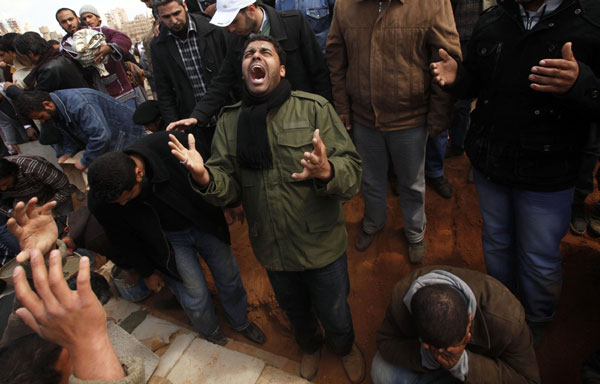Politics
Casualties expected to rise as unrest continues
Updated: 2011-03-24 08:51
By Zhang Chunyan (China Daily)
|
 A mourner reacts next to the grave of a rebel killed by forces loyal to Libyan leader Muammar Gadhafi, during his funeral in Benghazi on Wednesday. [Photo/Agencies] |
LONDON - The longer the allies' air strikes in Libya continue, the more civilians will be killed, British experts warned.
|
||||
Laffey said the military actions are misguided and ill-judged. "While they may have a temporary positive impact on the opposition forces in Libya, by destroying Gadhafi's military vehicles and disrupting supply lines, the long-term implications are mostly bad," he said.
Laffey predicted Libya may wind up divided into an eastern section, shored up by outside support, and a western region controlled by the current government.
As BBC reported, Libya's government says more civilians have been killed in a third night of air and missile strikes by coalition forces enforcing a no-fly zone.
Libyan government spokesman Moussa Ibrahim told a news conference that air and missile strikes had caused "numerous" civilian casualties, especially at the "civilian airport" in Sirte.
"If air strikes go on, there is increasing risk of civilian casualties and of retribution by the Libyan government against the rebels," Laura Hammond, senior lecturer of development studies at SOAS, told China Daily.
Hammond said the UN-sanctioned strikes and the Libyan government's own military actions must be carried out in line with international humanitarian law.
The best scenario would be if the strikes achieve their goal and end quickly, she said.
In terms of the war's goals, Richard Caplan, director of the Centre for International Studies at University of Oxford, said, "The air strikes are designed to prevent the Gadhafi regime from mounting further attacks on rebel strongholds, in particular Benghazi, and thereby also to protect civilians who have been implicated in these attacks."
France, the US and the UK, who led the diplomatic campaign in support of the UN resolution, are now leading the military campaign, Caplan said.
However, there is confusion over the goal of the military campaign. General David Richards, Britain's chief of the defense staff, has said that the UN resolution does not authorize regime change. But Downing Street and ministers say it would be legal to target Colonel Gadhafi if he was threatening civilians.
The dispute between British Prime Minister David Cameron and his generals over whether Gadhafi is a legitimate target - Cameron seems to think he is - illustrates well the complexities involved, Laffey said.
Cameron won the overwhelming support of the House of Commons on Monday, with 557 MPs in all backing military action and only 13 voting against.
The Arab League supports a no-fly zone but not the destruction of the Libyan air defenses that is needed so it can be enforced.
In the coalition forces, US President Barack Obama said control of the mission would pass to a British-French alliance or NATO within days. But Germany and Turkey oppose NATO control while Italy will withdraw its support if NATO is not in charge.
"Germany has been skeptical about intervening militarily in what is, in effect, a civil war. Germany has also been concerned about the consequences such action could have for popular revolts elsewhere in the Arab world," Caplan said.
Specials

'Super moon'
The "Super Moon" arrives at its closest point to the Earth in 2011.

Radiation test
The probability of being exposed to a life-threatening level of radiation is quite slim.

Panic buying of salt
Worried Chinese shoppers stripped stores of salt on radiation fears.



